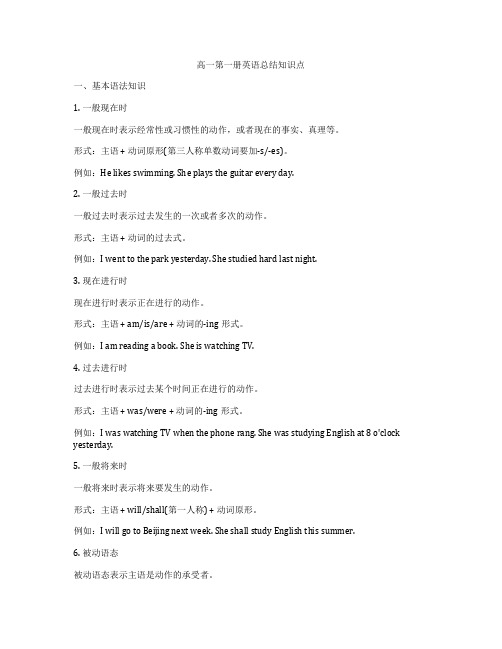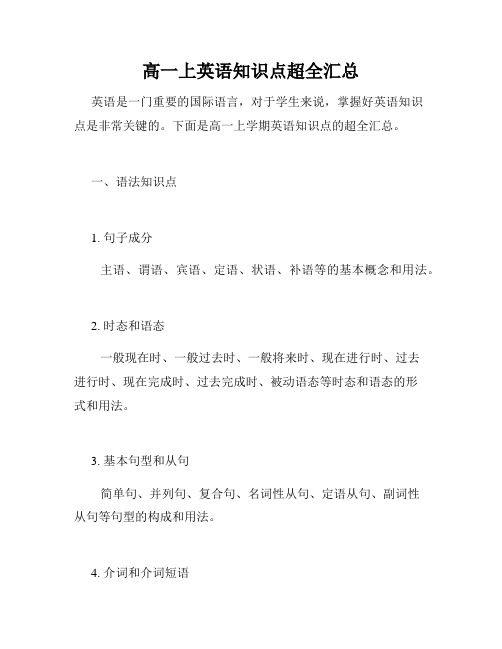高一英语重点句型知识点总结上册
- 格式:doc
- 大小:401.30 KB
- 文档页数:9

高一英语必修一重点短语Unit 1wake up 醒来wander off 漫步most of the time 大部分时间either…or… 或……或……spend…(in)doing sth 花费时间做某事determine to do sth (动作)be determined to do sth (心理) 决心干某事think about 看法work out 得出;解决argue for 为……辩护argue with 与……争论/争辩argue against 争辩……set up (具体)设置;安装/(抽象)建立do some research 做研究choose to do sth. 宁愿、偏要、决定做某事catch one’s eye 引起某人的注意care for 照顾be intended for/to do 为……而准备、预定reach a doctor 找到医生must have done 一定是;想必是as well as ……也second to 次于get sb. into 使某人进入/陷入story after story 一个故事接着一个day after day 一天又一天deliver a baby 给……接生make sure 确保carry on 继续be concerned about 对……关心put…to death 处死devote…to…把……专注于……rather than 不是……而是……mean doing 意味着mean to do 打算做……settle down 安顿下来apply to 应用到……be prepared to 已经做好准备去做……prepare to do 准备要做……calm down 镇定下来share sth with sb 和某人分享某物hide away 躲藏;隐藏set down 放下;记下a series of 一系列;一套be crazy about 对…着迷on purpose 故意in order to/ so as to 为了get along with 与…相处pack up 收拾,打理行装have trouble with sb/sth同某人闹意见;做…有困难communicate with sb 和…交际be good to 对….友好add up 合计another time 改时间get sth done 使…被做make a list of 列出go through 经历;仔细检查face to face 面对面地according to 按照;根据…所说fall in love 相爱throw away the friendship 放弃/终止友谊try out 试验;试用far and wide 到处look to sth 注意,留心某事cheat sb (out) of sth 骗取某人某物have the/a habit of doing sth 有做…的习惯be ignorant of 无知的重点句型1. I wonder if… 我想知道是否….2. It’s because… 这是因为….(此从句中because不能用since或as 代替)3. It was the first time in a year and a half that I’d seen the night face to face.这是我一年半以来第一次目睹夜晚。

高一英语必修一知识点总结之重点句型汇总1. It is important/imperative/vital/crucial/necessary/essential to + 动词原形- It is important to take care of your health.- It is necessary to study hard for the exam.2. It is said/believed/thought that + 句子- It is said that he is a talented musician.- It is believed that exercise is good for your overall well-being.3. There is no doubt/denying/denied that + 句子- There is no doubt that he is a trustworthy person.- There is no denying that technology has greatly improved our lives.4. It is not only A, but also B.- It is not only important to eat well, but also to exercise regularly.- It is not only her talent, but also her hard work that led to her success.5. Not only A, but also B.- Not only did he study hard, but he also participated in various extracurricular activities.- Not only is she a talented singer, but she is also a gifted writer.6. It is (highly) likely/probable that + 句子- It is likely that he will be chosen as the team captain.- It is probable that the concert will be sold out.7. There is/are + 名词 + who/which- There are many students who want to join the school club.- There is a doctor who specializes in treating rare diseases.8. The more A, the more B.- The more you practice, the better you will become.- The more you study, the higher your grades will be.9. It is not until + 过去时 + that + 句子- It is not until he saw the doctor that he realized how serious his illness was.- It was not until I read the book that I understood the underlying message.10. It is + 形容词 + that + 句子- It is interesting that she chose to study abroad.- It is impressive that he managed to finish the project ahead of schedule.这些句型在高一英语必修一的学习中经常会用到,掌握这些句型可以帮助你更好地表达自己的观点和思路。

高一上期英语语法知识点一、主语和谓语在英语句子中,主语和谓语是最基本的两个成分。
主语是句子的中心,而谓语则是对主语进行陈述或描述的动作或状态。
例如:1. My sister is playing tennis.(我妹妹正在打网球。
)主语:My sister谓语:is playing2. The dog barks loudly.(那只狗吠得非常响。
)主语:The dog谓语:barks二、名词名词是表示人、事物、地方和抽象概念的词语。
名词可以用来作为主语、宾语、表语等。
例如:1. Lisa is a student.(丽莎是个学生。
)主语:Lisa谓语:is表语:a student2. I have two cats.(我有两只猫。
)主语:I谓语:have宾语:two cats三、动词动词是表示动作、行为、状态的词语,它可以单独作为谓语,也可以与助动词、情态动词等组成谓语。
例如:1. Tom is watching TV.(汤姆在看电视。
)主语:Tom谓语:is watching2. They can swim very well.(他们游泳非常好。
)主语:They谓语:can swim四、形容词和副词形容词和副词是修饰名词或其他词语的词汇,形容词通常修饰名词,而副词则修饰动词、形容词和其他副词。
例如:1. She has a beautiful garden.(她有一个美丽的花园。
)名词:garden形容词:beautiful2. He speaks English fluently.(他流利地讲英语。
)动词:speaks副词:fluently五、代词代词是用来代替名词的词语,便于避免重复使用同一个名词,同时也能让句子更加简洁明了。
例如:1. Jack is my friend. He is very kind.(杰克是我的朋友。
他非常友善。
)代词:He2. Can you pass me that book? I want to read it.(你能把那本书递给我吗?我想读一下。

高一第一册英语总结知识点一、基本语法知识1. 一般现在时一般现在时表示经常性或习惯性的动作,或者现在的事实、真理等。
形式:主语 + 动词原形(第三人称单数动词要加-s/-es)。
例如:He likes swimming. She plays the guitar every day.2. 一般过去时一般过去时表示过去发生的一次或者多次的动作。
形式:主语 + 动词的过去式。
例如:I went to the park yesterday. She studied hard last night.3. 现在进行时现在进行时表示正在进行的动作。
形式:主语 + am/is/are + 动词的-ing形式。
例如:I am reading a book. She is watching TV.4. 过去进行时过去进行时表示过去某个时间正在进行的动作。
形式:主语 + was/were + 动词的-ing形式。
例如:I was watching TV when the phone rang. She was studying English at 8 o'clock yesterday.5. 一般将来时一般将来时表示将来要发生的动作。
形式:主语 + will/shall(第一人称) + 动词原形。
例如:I will go to Beijing next week. She shall study English this summer.6. 被动语态被动语态表示主语是动作的承受者。
形式:主语 + am/is/are + 动词的过去分词。
例如:The book is read by me. The cake was eaten by the children.7. 可数名词和不可数名词可数名词是指可以用数目来计算的名词。
不可数名词是指不能以数目计算的名词。
例如:book/books, water, rice。

高一英语必修一知识点归纳总结高一英语必修一知识点归纳总结高一英语必修一知识点归纳篇一1.be good to对……友好be good for对……有益;be bad to…/be bad for…2.add up加起来增加add up to合计,总计add…to把……加到……3.not…until/till意思是“直到…才”4.XXX使……完成/使某人被……5.calm down平静下来6.XXX关心,关注7.当while,when,before,after等引导的时间状语从句中的主语与主句的主语一致时,可将从句中的主语和be动词省去。
While walking the dog,you were careless and it got loose.8.cheat in the exam考试作弊9.go through经历;度过;获准,通过10.hide away潜藏;潜藏11.set down写下,记下12.I wonder if…我不知道是不是…12.on purpose故意13.XXX某人发生某事XXX do XXX某人碰巧做某事it XXX……正巧碰巧14.It is the first(second…)that…(从句谓语动词用现在完成时)15.in one’s power处于……的控制之中16.It’s no pleasure doing…做…没有乐趣It’s no good/use doing sth.做某事是没优点/没用的17.She found it difficult to XXX.it做形式宾语18.suffer from患…病;遭受19.XXX…20.get tired of…对…感触劳顿怠倦21.have XXX在……上遇到了麻烦22.get along with sb/sth.与某人相处23.ask(sb)for advice.(向某人)征求建议24.make后接复合宾语,宾语补足语须用不带to的不定式、形容词、过去分词、名词等。

高一上英语知识点超全汇总英语是一门重要的国际语言,对于学生来说,掌握好英语知识点是非常关键的。
下面是高一上学期英语知识点的超全汇总。
一、语法知识点1. 句子成分主语、谓语、宾语、定语、状语、补语等的基本概念和用法。
2. 时态和语态一般现在时、一般过去时、一般将来时、现在进行时、过去进行时、现在完成时、过去完成时、被动语态等时态和语态的形式和用法。
3. 基本句型和从句简单句、并列句、复合句、名词性从句、定语从句、副词性从句等句型的构成和用法。
4. 介词和介词短语常用介词的概念、用法及其常见的短语搭配。
5. 动词动词的形式变化、时态和语态的用法,以及常见的动词短语。
6. 形容词和副词形容词和副词的基本概念、比较级和最高级的用法,以及副词修饰动词、形容词和副词的规则和特殊情况。
7. 代词人称代词、物主代词、指示代词、不定代词和反身代词的形式和用法。
二、阅读技巧和理解1. 阅读理解包括主旨大意题、细节理解题、推理判断题等类型的阅读理解题目的解题方法和技巧。
2. 标题匹配和段落填空根据文章的结构和内容特点,准确匹配标题和填写文章空白处的正确信息。
3. 语法填空根据上下文的语境和语法规则,填写合适的词语或形式。
4. 短文改错对文章中的错误进行定位和改正,包括拼写、词性、时态、语态等方面的错误。
5. 能力提升阅读难度较高的长篇阅读材料,提高阅读理解和阅读能力。
三、写作技巧和练习1. 书信写作包括邀请信、投诉信、建议信、感谢信等常见的书信写作类型。
2. 日记和笔记练习写作日记、笔记,提高写作和整理信息的能力。
3. 句型转换和语法填空练习句子结构的转换和语法规则的运用。
4. 短文写作练习写作短文,包括记叙文、说明文和议论文等不同类型的写作。
5. 写作能力提升提高写作的表达能力,通过写作锻炼和积累,表达自己的观点和思考。
以上是高一上学期英语知识点的超全汇总,希望对你的学习有所帮助。
通过掌握这些知识点,相信你的英语水平将得到有效提升。
高一英语上册知识点总结一、词汇。
1. 重点单词。
- add up:合计。
例如:Add up these numbers and you will get the result.(把这些数字加起来,你就会得到结果。
)- upset:adj. 心烦意乱的;不安的;vt. 使不安;使心烦。
如:She was upset about losing her wallet.(她因为丢了钱包而心烦意乱。
)- ignore:vt. 不理睬;忽视。
例如:He ignored my advice and made a big mistake.(他忽视了我的建议,犯了一个大错误。
)- calm:vt. & vi. (使)平静;(使)镇定;adj. 平静的;镇静的;沉着的。
如:Calm down and tell me what happened.(冷静下来,告诉我发生了什么事。
)- concern:vt. (使)担忧;涉及;关系到;n. 担心;关注;(利害)关系。
例如:This matter concerns all of us.(这件事与我们所有人都有关系。
)- go through:经历;经受;仔细检查;完成。
例如:He has gone through a lot of difficulties in his life.(他一生经历了许多困难。
)- set down:记下;放下;登记。
如:Please set down what the teacher said.(请记下老师所说的话。
)- series:n. 连续;系列。
例如:a series of meetings(一系列会议)2. 构词法。
- 加 -ment构成名词:例如,develop(v. 发展) - development(n. 发展);achieve(v. 实现;达到) - achievement(n. 成就)。
- 加 -tion构成名词:如,communicate(v. 交流) - communication(n. 交流);educate(v. 教育) - education(n. 教育)。
高一上册英语语法知识点总结(实用版)编制人:__审核人:__审批人:__编制单位:__编制时间:__年__月__日序言下载提示:该文档是本店铺精心编制而成的,希望大家下载后,能够帮助大家解决实际问题。
文档下载后可定制修改,请根据实际需要进行调整和使用,谢谢!并且,本店铺为大家提供各种类型的实用资料,如教案大全、书信范文、述职报告、合同范本、工作总结、演讲稿、心得体会、作文大全、工作计划、其他资料等等,想了解不同资料格式和写法,敬请关注!Download tips: This document is carefully compiled by this editor.I hope that after you download it, it can help you solve practical problems. The document can be customized and modified after downloading, please adjust and use it according to actual needs, thank you!Moreover, our store provides various types of practical materials for everyone, such as lesson plans, letter templates, job reports, contract templates, work summaries, speeches, reflections, essay summaries, work plans, and other materials. If you want to learn about different data formats and writing methods, please stay tuned!高一上册英语语法知识点总结本店铺为各位同学整理了《高一上册英语语法知识点总结》,希望对你的学习有所帮助!1.高一上册英语语法知识点总结篇一一般现在时1. 表示现在习惯或经常反复发生的动作或存在的状态, 常与usually, always, sometimes, often, every day / week / month / year等时间状语连用。
高一英语上册知识点梳理高一英语上册知识点(一)、some与any的用法1.some用于肯定句以及表示建议或期待得到肯定回答的问句。
修饰单数名词时,意为某个。
如:I have some questions about the assignment. (希望得到肯定答复)。
2. any用于否定句和疑问句时,表示一些。
用于肯定句时,只和单数名词或不可数名词连用,表示任何。
如:The medicine is on sale every where. You can get it at any chemist?s.(二) 、 each与every的用法1. each强调个体,表示两个或两个以上中的每一个,在句中可充当主语、宾语、定语和同位语。
如:There are trees and flowers at each side of the road.2. every强调整体,表示三者或三者以上中的每一个,只能作定语,不能说every of them,要说every one of them .Every student in our class works hard.(三)、 no one与none的用法1. no one意为没有人,只能指人,不能指物,不可与介词of连用,谓语动词用单数形式,回答who引导的问句。
如:Who is in the classroom? No one.2. none既可指人,也可指物,强调数量,意为一点也不,一个也不;谓语动词既可用单数也可用复数;常与of连用,通常指三者以上的人或物中没有一个,回答how much和how many引导的问句。
如:They were all tired,but none of them would stop to have a rest.英语怎么学才能提高1、提高词汇量,多读多背单词。
对于英语学习来说,词汇量是非常重要的,英语单词就是我们学习英语的基础。
高中必修一各单元英语知识点人的威严蕴藏在知识之中,因此,人有许多君主的金银无法买到,君主的武力不可征服内在的东西。
下面小编给大家分享一些高中必修一各单元英语知识,希望能够帮助大家,欢迎阅读!高中必修一各单元英语知识1Unit One Friendship一、重点短语1.go through 经历,经受get through 通过;完成;接通电话2. set down 记下,放下3. a series of 一系列4. on purpose 有目的的5. in order to 为了6. at dusk 傍晚,黄昏时刻7. face to face 面对面8. fall in love 爱上9. join in 参加(某个活动);take part in 参加(活动)join 加入(组织,团队,并成为其中一员)10. calm down 冷静下来11. suffer from 遭受12. be/get tired of…对…感到厌倦13. be concerned about 关心14. get on/along well with 与…相处融洽15. be good at/do well in 擅长于…16. find it + adj. to do sth. 发现做某事是…17. no longer / not …any longer 不再…18. too much 太多(后接不可数n.)much too 太…(后接adj.)19. not…until 直到… 才20. it’s no pleasure doing sth 做… 并不开心21. make sb. sth. 使某人成为…make sb. do sth. 使某人做某事二、语法----直接引语和间接引语概念:直接引语:直接引述别人的原话。
一般前后要加引号。
间接引语:用自己的话转述别人的话。
间接引语在多数情况下可构成宾语从句且不要加引号。
高一英语重点句型知识点总结(上册) 高一英语重点句型知识点总结(上册)1.“So + be/have/助动词/情态动词+主词”的结构。
此结构中的语序是倒装的,“So”代替上句中的某个成分。
如果上面一句是否定句,则使用“Neither/Nor+be/have/助动词/情态动词+主语”的结构。
例如He’s tired,and so am I.(=I’ m also tired.) You can swim,and so can I.(=I can also swim.) She has had supper,and so can I.(=I’ve had lunch,too.)Tom speaks English,and so d.(=Haks English,too.) A: I waday.B: So did I.(=I also waday.)2.“So +主语+be/have/助动词/情态动词”结构中的主谓是正常语序,so相当于indeed,certainly,表示说话人对前面或对方所说情况的肯定、赞同或证实,语气较强,意思是“确实如此”。
例如 A:It was cold yesterday.昨天很冷。
B:So it was.的确如此。
(=Yes,it was.)A:Youl.B:So I do.(=Yes,I do.)A:It will bw.B:So it will.(=Yes ,it will.)3.“主语+do/does/did + so”结构指的是按上句的要求做了。
此句型中do so代替上文中要求做的事,以免重复。
acher toldandand I did so.(=I handed) 语文老师叫我按时交作文, 我照办了。
4.with…或Iame with…句型表示“……(的情况)也是如此。
”当前面的句子中有几种不同形式的谓语时,要表示相同情况,必须使用本句型,不能使用so 引起的倒装句。
She doesn’t plaano, but she lgingw、There you are. 行了,好。
这是一句表示一种事情告一段落或有了最终结果的用语。
如:There you are! Then let's hav除此之外,还可以表示“瞧,对吧(果然如此)”的语气。
例如:There you are! I knew we should find it at last.对吧!我就知道我们最终能找到的。
6、have some difficulty (in) doing sth.干某事有困难;接名词时,常用句型:have somedifficulty w①Do you have any difficulty (in) understanding English?你理解英语口语有困难吗?②She said she had so me difficulty wunciation.她说她在发音方面有困难。
7、have a good knowledg“掌握……”,“对……有某种程度的了解”①He has a good knowledge of London.他对伦敦有所了解。
②A good knowledge of languages is always useful.8、Tree awent own, cut down by the water, which must have bdeep.一棵又一棵的树被水冲倒、冲断。
那水肯定有三米深。
“must have + 过去分词”表示对已发生事情的猜测。
在英语中,must,may,can三个情态动词可用来表示对事情的猜测。
Must意为“肯定”,语气很有把握;may意为“可能”、“也许”,语气把握性不大。
两者常用在肯定句中。
Can意为“肯定”、“也许”,常用在否定句或疑问句中。
Must,may,can三者用于表示猜测时,其后面可跟三种不同的动词形式:1)跟动词原形表示对现在事情的猜测;2)跟be doing表示对正在发生事情的猜测;3)跟have done 表示对已经发生的事情的猜测。
例如:Helen is Lucy’s good friend. She must know Lucy’s e-mail.海伦是露茜的好朋友。
她肯定知道露茜的电子邮件。
We can hear loud vg room. They must be quarrelling.我们可以听到会议室很吵。
他们肯定在吵架。
Iat the gate aago. He can’t have gone to Australia.我刚才还在大门口见过杰夫。
他不可能去了澳大利亚。
9、Wei Buanuts and it was fuaand.魏彬拿出一些花生。
看着猴子从他手上吃花生,很有趣。
fun “好玩,趣事”,不可数名词,前面不加不定冠词a。
You’re sure to havun at the paght. 今天晚上你肯定会玩得很开心。
make fun of“取笑”,“嘲弄”。
People make fuly becauwearing such astrange jacket.人们嘲笑他只是因为他穿了一件那么奇怪的衣服。
funny adj. “可笑的,滑稽的”。
He looks veryfuathe r’s jacket.他穿着他父亲的衣服,看上去很滑稽。
10、Many people who saw the film were afraid to swa……许多看过这部电影的人都不敢在海里游。
afraid 用法说明:1)害怕人/ 物,如:be afraid of * / sth2)不敢做某事,如:be afraid to do sth / of doing sth He is afraid to go out / of going out alone at night.3) 担心会发生某事, 如: be afraid of doing sth或be afraid + that clauseHe seldom standver bank becauafraid of fallingver. He seldom standver bank becauafraid that he might fallver.4) 给人不愉快的信息或不赞同某人意见时, 用I’mafraid …, 如:I’m afraid I’ve got bad newu.I’m afraid I can’t agr ee with you.11、It is polating everything on your plate.把你盘子里所有东西吃完是有礼貌的。
这是一个动词不定式作主语的句型,其中ating everything 是主语,it是形式主语。
12、I wish you all the best.我祝你万事如意.用wish来表示祝愿的结构是wish * sth, 此外我们还可以用may来表示祝愿: May * do sth如:May you succeed.13、Wa riva city. 有河流的地方就有城市。
Where在这里引导的是地点状语从句,相当于介词in/ at/ to + the place + where从句9定语从句),意思是“在……地方”。
例如:W无风不起浪;事出有因。
He lives wlimald.他住在气候温暖的地方。
14、Strong, proud, and unitedlPetersburg adRussia . 圣彼得堡人民坚强不屈、充满自豪、团结一致,他们是俄罗斯当代的英雄。
Strong, proud, and united为前置定语,在这里相当于一个非限制性定语从句:The peoplPetersburg , who ag, proud, and united, adRussia . 当主语比较短时,这类短语常常放在句首。
gratulations!是一句祝贺用语,在使用时要用复数形式。
其他几个通常以复数形式出现表达特定含义的名词有:manners(礼貌):He is a little boy with good manners.这个小男孩很有礼貌。
regards (问候):Please send my regards to your parents.请代我问候你父母。
16. Every four years athlall over the world take palympic Games.没四年,世界各地的运动员们都要参加奥运会。
“every + 基数词 + 时间/ 距离单位”词表示“每多少时间/ 距离”。
如:every five days(每五天), evurs(每三小时), ev(每十公尺)类似表达形式还有:evday, evd hour“每隔一天”的表达形式有:evd day, every two days, evday.17、Modern cellphones aan ju—they are used as cameras and radios, andto send e-mail or surf the I现代的手机不仅仅是电话机—它们也当坐照相机和收音机使用,还可以发送电子邮件和上网。
use A as B 把A用作B。
例如:In ale usedas tools for farming.在古代,人们把石头用作耕作的工具。
udo sth用某物来做某事。
例如:In ale usedll animald.在古代,人们用石头来捕杀动物获取食物。
18、The answbe that we have a need to stay in touch wds and family nomatter where we are or what we are doing.答案似乎是:无论我们在何处或正在做什么,我们都需要和朋友以及家人一直保持联系。
1) seem 似乎,好像,其用法及搭配有:seem + adj., 如:This probllicated, but actuallle.这个问题看似复杂,其实很简单。
doIavwhere before.我好像以前在哪儿见过他。
Iat…,Iat everything is going on well.好像一切正常。
Ias if…,Ias if it’s going to rain.看来快要下雨了。
2) no matter无论,不管,后面常跟疑问词引导的从句,其意相当于疑问词后加ever。
如 no matter what=whatever; no matter where=wherever; no matter how=however; no matter when=whenever例如:No matter when (Whenever) Ialways wearing that old hat. 不管我什么时候遇见他,他总是戴着那顶旧礼帽。